Kathleen Jones's Blog, page 61
November 15, 2012
National Short Story Week: "Traffic"
It's National Short Story week and some members of Authors Electric thought it would be fun to share a short story to celebrate. This is my contribution - set in Italy where a jazz musician has taken his girlfriend to a borrowed cottage for a holiday that doesn't go exactly to plan. For more information and stories please take a look at the
Indie E-book Review
site where Cally Phillips has more entertainment lined up! And Cally has more stories FREE on
her own blogsite
too.
By the time you read this I, too, will be on trains and planes - hopefully having a better experience than Breda and Noel!
 ‘It’s a good job we couldn’t cancel the other flights,’ Breda said, looking at the stationary cars in front of them.
‘It’s a good job we couldn’t cancel the other flights,’ Breda said, looking at the stationary cars in front of them.
TRAFFIC
Breda knew that something was wrong as she turned her head on the pillow and peered up into the darkness, puzzlingly awake. Should she be awake? She could feel the solid bulk of Noel next to her, his deep even breathing. The warm depth of the mattress pulled her down again, but the darkness, and the silence of the room she couldn’t see, continued to hover above her with disturbing persistence.
She put out her hand and pressed the small button to illuminate the clock face. It was five thirty three. Five thirty three! Diving out of the bed into the damp cold air she flung on the light crying out to Noel, ‘We’ve slept in. Come on .....’ He groaned as she tugged the duvet off him.
Breda’s brain refused to be orderly. She had one sock on, while she struggled to get the gas alight under the kettle, but gave up when she discovered Noel had already turned the cylinder off. She tried to brush her hair while wrestling the sheet off the bed, tossing nightclothes and washbag into the suitcase, the contents of the fridge into a bin liner. Noel was being maddeningly methodical; checking cupboards, reading the meters.
‘It would have to be bloody raining,’ he said as he went out to get the car and park it in front of the door.
A black downpour sluiced the front steps.
This was not how Breda had imagined Italy. It had rained almost every day they’d spent in this borrowed house. The view of the domed cathedral from the kitchen window, the spectacular walled hill-top towns visible from the bedroom had all looked enticing and mysterious in the sunny emulsion of other people’s photographs. Seen through a curtain of rain their charm had diminished.
‘Why the fuck did you have to bring so much stuff?’ Noel asked as he tried to zip up the suitcase.
‘It’s a good job I did, or we’d have frozen to death.’
‘It isn’t that cold.’ Noel’s body had an efficient thermostat. He did rugby training in winter; swam in unheated swimming pools; his feet were always warm.
Breda could feel the cool terracotta of these Tuscan floors even through the soles of her trainers. Mediterranean heat was what her body had craved. It had drawn her south, away from a grey, damp English autumn that sapped her spirits and left her enervated and miserable. Just her luck that a freak storm had blown across from the Sahara bringing red dust, torrential rain and now an icy wind as it drew air down from Eastern Europe. There had been snow in Spain and Greece - even a few flakes in Rome. The romantic idyll Breda had imagined - candlelit dinners in little restaurants - lunch on sunny terraces overlooking the sea, wandering hand in hand around old medieval hill forts - had metamorphosed into tortuous drives up hair pin roads in thrashing rain, dodging manic Italian drivers, shivering in narrow streets as they searched for yet another church to shelter in, or steamy Tabacchi with rude assistants who served lukewarm café latte and stale foccaccia. And back at the house there had been the interminable practicing - up and down, up and down, complicated crescendos and diminuendos on the sax. There were no holidays for a musician.
‘Have you got the map?’ Noel asked, revving up the engine to get warm air on the windscreen, where it clouded like breath on a mirror.
‘Which way are we going?’
It was still dark. The road glistened in the headlights, rolling towards them like a video game.
‘I thought, as we’re late, I’d try the low road up to Mondiale and get onto the autostrada there. It’s a bit tricky round Chieso. Do you think you can work it out?’
It seemed pretty straightforward in the beam from the torch, but Breda was used to his rude remarks about her map reading skills. ‘You just concentrate on keeping out of the ditch and not hitting anything and I’ll concentrate on getting us there,’ she said.
‘Don’t bloody backseat drive. I’ve got enough to deal with. I don’t need you nagging me.’
‘It wasn’t me that scrunched the wing mirror on a wall!’
For a moment Breda thought Noel was going to explode, then she said. ‘Sorry. I’m cross and grumpy because we slept in. I need breakfast.’
‘We can’t stop for anything or we’ll miss the plane.’ Noel’s face was set above the wheel, staring ahead into the darkness, concentrating utterly on the road ahead, which had a tendency to leap unpredictably either to left or right. Strange ghostly shapes were trying to appear in the darkness as a foggy dawn began to liberate the landscape. Cypresses, like exclamation marks, punctuated vague horizons.
Breda felt obscurely depressed. Had a sense of loss - not of something she’d had, but of something she hadn’t managed to find. She was leaving Italy without whatever it was she’d come for.
Daylight was wet and the colour of concrete. Traffic already whizzed on the autostrade. It tried Noel’s nerves. He was a physical person, machinery was anathema.
‘God look at that!’ He shouted as yet another BMW appeared on their bumper out of nowhere flashing its lights to bully them into the inside lane between two lethally unstable lorries with Czech number plates.
Breda wished he’d let her drive, but Noel was an even more nervous passenger. ‘Can you remember if we locked the door?’ she asked suddenly.
‘No idea. You had the key.’
‘It’s in my bag. But I can’t remember putting it in the lock.’
‘Well, it’s too fucking late to worry about that now.’
What did she see in him? Breda asked herself as she studied his firm, square knuckled hands on the steering wheel, the frowning profile. It was a question she couldn’t answer and she felt guilty that she’d even allowed herself to think it. His abrasive edge, his curious mix of arrogance and nervousness seemed necessary to her.
There was a lighted sign on a gantry Breda couldn’t read clearly.
‘What did it say?’ Noel asked.
‘Something about Valdamo. I think it was ‘Inciso’.’
‘What’s that?’
Breda hastily paged through the little Italian dictionary. ‘Inciso. Digression or diversion.’
‘Shit!’
But there were no diversion signs at the Valdamo junction. ‘Whatever it was it’s probably disappeared by now.’ Noel said. ‘And we’ve almost made up the late start.’
But, even as he said the words, tail lights illuminated like a long red snake in double rows as far as the eye could see. Something flashed a long way in front. Everything stopped.
Noel banged his hands on the wheel. ‘This is fucking marvellous! Are you sure you read that sign right?’
Breda sighed. ‘I’ve no idea. It was only there for a moment - my Italian isn’t that good.’
‘I have to be back in London by three. If we miss that bloody flight ......’ Noel thumped his head back against the neck rest and closed his eyes.
Breda heard the words he didn’t say. It was - of course - her fault that the alarm hadn’t gone off (had she set it properly?), her fault she hadn’t been able to read the blurred sign that had flashed past. She knew how important this was for him. Noel’s agent had rung him on the second day of their holiday. Someone had dropped out and he’d been offered a gig - five nights at Ronnie Scott’s. Not front line, but backing a famous American over from the states for a tour. It was, Noel said, his Big Chance. So of course he had to go back a couple of days earlier than they’d planned and - equally of course - he’d assumed that she would cut her holiday short and go with him. Why hadn’t she protested? She’d even booked the flights on the computer at the little Tabacchi on the corner of their street. Thirty euros each. Noel had been furious that their original flights couldn’t be transferred and that they weren’t able to get their money back on the bookings, but the cheapness of the new tickets had mollified him a little.
‘It’s a good job we couldn’t cancel the other flights,’ Breda said, looking at the stationary cars in front of them. The tail lights went out one by one as they switched off their engines.
Noel made an angry sound and flung himself out of the car.
Breda’s stomach rumbled. She could smell coffee. A man in the car next to theirs was drinking something out of a thermos flask. The espresso and brioche she’d been looking forward to having in Pisa airport suddenly seemed very attractive. The man saw her looking at him; he smiled and lowered his window and said something in Italian.
‘Sorry,’ Breda said, embarrassed. ‘We’re English.’
‘Ah,’ he said. ‘I was just saying that fate seems to be against us this morning.’
‘Do you know what’s happened?’
‘Un incidente. An accident, I think. It happens quite often on this part of the autostrada. We are used to it.’ He shrugged and inclined his tanned, closely shaven head as if nodding to fate. ‘We all blame Berlusconi - he is not to blame of course, but it makes us feel better.’
Noel was prowling up and down between the cars with his mobile clutched to his cheek. Who was he talking to?
‘Would you like coffee?’ the Italian asked. He handed her the lid of the flask. The liquid was jet black with little creamy bubbles at the edge.
‘I’m taking your breakfast,’ Breda said, hesitating.
He made a dismissive gesture. ‘Non importa. I have plenty.’
‘You speak very good English.’
‘I am a journalist on La Nazione in Firenze.’
‘How strange - I work for an evening newspaper in London.’ Breda thought briefly about the small hot office she was returning to, the grubby gossip about politicians and celebrities she was expected to cover, as well as the real calamities of people’s lives she dealt with so lightly. It was all so unappealing she knew she wouldn’t care, ever, if she didn’t arrive. She took a long gulp of the coffee. It was thick and bitter.
‘I hate my work,’ she said.
The Italian smiled. He had good teeth. ‘Then why do you not do something else?’
She’d thought about it often. But what else could she do? She was trained for the job and well paid for it. What else would pay the substantial rent? Noel’s earnings from gigs were too sporadic to be relied on. Breda often thought of the old musician’s joke trotted out in the bar after a gig to embarrass some newly single bloke: ‘What do you call a musician without a girlfriend?’ There would be cynical laughter while everyone waited for the punchline which they all knew by heart. So what was a musician without a girlfriend? - ‘Homeless!’ It hurt because it was true. When she and Noel had moved in together a year ago, it was Breda’s name that had been on the tenancy agreement.
When they'd first met, at farewell drinks for a mutual friend who was going to Canada, Breda had also been about to leave. She’d saved up enough money to go backpacking round the world with a girlfriend from university. They’d hoped to stay away for about a year, unless something else happened. But that something else had happened before she’d even managed to get on the plane. Noel had persuaded her to spend the money on furniture for the flat instead.
Breda got out of the car. She was surprised to find the air warm. There was an orange glow in the mist over to her left. Steam was rising from the ground, hanging in the air around her. Cars and trees shifted in and out of focus as it drifted through them.
‘I think we are going to see the sun today,’ the Italian said. He too had got out of his car.
‘I’ve been here five days and I haven’t seen it once.’ But just as Breda spoke the mist shifted again and an intense yellow disc throbbed briefly and then disappeared.
‘We have maltempo in Italy too - you British do not have a monopoly on weather. But it is never bad for too long.’
There was a shout behind them - Noel was walking back. ‘We’re moving,’ he called.
The Italian pulled out his wallet and handed her a square of white card. ‘Next time you are in Italy, call me at the newspaper,’ he said. ‘You might like to see how we do things here.’ His name was Giordano Saporetti.
‘Thanks,’ Breda smiled politely. The prospect of being here again seemed very remote and she was surprised how sad she felt - sad, angry and cheated.
The queue began to move, one lane at a time. She waved to Giordano as his car slid past.
‘We might just make it,’ Noel said, grasping the wheel. ‘And there’s a BA flight at eleven if we don’t. It’ll probably cost a fucking fortune, but we can claim on the insurance.’ He glanced at her, frowning. ‘You did take out the insurance?’
‘I can’t remember whether I ticked the box or not,’ Breda said. Why was it always down to her to remember these things?
‘Are you sure you’re not getting Alzheimers?’ Noel’s voice had a hard aggressive edge to it.
‘Why don’t you book your own bloody flights - set your own alarm clocks - then you’d only have yourself to blame!’ As the words tumbled carelessly out of her mouth, she was aware of Noel, taut as a spring, his face already contracting as it did when she offended him. Criticism was the one thing he couldn’t take. It was the stress of playing, he said when she tried to discuss it with him. You couldn’t make mistakes. When he was at home he didn’t want to be put under pressure.
The traffic slowed again. Stopped. Noel shouted out a string of expletives.
Breda listened wearily. Through the car window she could see that the mist was almost gone - a few remnants glittered in the trees like cobwebs woven by giant spiders. When she wound down the glass and put her head out, she looked up at a pale, cloudless sky where a dim, but unmistakable sun was burning through the fog. ‘It’s going to be a beautiful day,’ she said regretfully. Noel was on his mobile again, scrolling down the screen, texting someone.
At the airport, as soon as they’d dumped the car keys, he went straight to the BA desk. ‘We’ve got seats,’ the girl said, ‘but they’ll cost you two eighty each plus taxes.’ Noel sighed in exasperation. ‘It’s a rip-off, but I don’t suppose there’s any alternative,’ he said. ‘I have to be in rehearsal by three.’
‘But I don’t,’ Breda said. He turned to look at her. ‘You go. Take the luggage. I’ll spend the day in Pisa and use our original flights on Saturday.’
Noel’s face didn’t seem to know whether to be relieved at not having to shell out another three hundred pounds, or surprised that she wasn’t coming with him. ‘Will you be all right?’ he asked as she waved him through the security gate.
‘I’ll be fine. It would be a shame to waste a day like this.’
There was no goodbye kiss. He seemed preoccupied, hurried, as he put his saxophone and jacket in the tray and prepared to go through the scanner. He didn’t look back.
Then she was standing on the grass outside the airport, with only a shoulder bag, the sunlight full on her face. She felt warm and weightless. The sign said, ‘Pisa Centro’. Breda smiled, and began to walk in the direction of the arrow.
~~~~~~~~~~~~~~~~~~~~~~~~~~~~
© Kathleen Jones 2009
By the time you read this I, too, will be on trains and planes - hopefully having a better experience than Breda and Noel!
 ‘It’s a good job we couldn’t cancel the other flights,’ Breda said, looking at the stationary cars in front of them.
‘It’s a good job we couldn’t cancel the other flights,’ Breda said, looking at the stationary cars in front of them. TRAFFIC
Breda knew that something was wrong as she turned her head on the pillow and peered up into the darkness, puzzlingly awake. Should she be awake? She could feel the solid bulk of Noel next to her, his deep even breathing. The warm depth of the mattress pulled her down again, but the darkness, and the silence of the room she couldn’t see, continued to hover above her with disturbing persistence.
She put out her hand and pressed the small button to illuminate the clock face. It was five thirty three. Five thirty three! Diving out of the bed into the damp cold air she flung on the light crying out to Noel, ‘We’ve slept in. Come on .....’ He groaned as she tugged the duvet off him.
Breda’s brain refused to be orderly. She had one sock on, while she struggled to get the gas alight under the kettle, but gave up when she discovered Noel had already turned the cylinder off. She tried to brush her hair while wrestling the sheet off the bed, tossing nightclothes and washbag into the suitcase, the contents of the fridge into a bin liner. Noel was being maddeningly methodical; checking cupboards, reading the meters.
‘It would have to be bloody raining,’ he said as he went out to get the car and park it in front of the door.
A black downpour sluiced the front steps.
This was not how Breda had imagined Italy. It had rained almost every day they’d spent in this borrowed house. The view of the domed cathedral from the kitchen window, the spectacular walled hill-top towns visible from the bedroom had all looked enticing and mysterious in the sunny emulsion of other people’s photographs. Seen through a curtain of rain their charm had diminished.
‘Why the fuck did you have to bring so much stuff?’ Noel asked as he tried to zip up the suitcase.
‘It’s a good job I did, or we’d have frozen to death.’
‘It isn’t that cold.’ Noel’s body had an efficient thermostat. He did rugby training in winter; swam in unheated swimming pools; his feet were always warm.
Breda could feel the cool terracotta of these Tuscan floors even through the soles of her trainers. Mediterranean heat was what her body had craved. It had drawn her south, away from a grey, damp English autumn that sapped her spirits and left her enervated and miserable. Just her luck that a freak storm had blown across from the Sahara bringing red dust, torrential rain and now an icy wind as it drew air down from Eastern Europe. There had been snow in Spain and Greece - even a few flakes in Rome. The romantic idyll Breda had imagined - candlelit dinners in little restaurants - lunch on sunny terraces overlooking the sea, wandering hand in hand around old medieval hill forts - had metamorphosed into tortuous drives up hair pin roads in thrashing rain, dodging manic Italian drivers, shivering in narrow streets as they searched for yet another church to shelter in, or steamy Tabacchi with rude assistants who served lukewarm café latte and stale foccaccia. And back at the house there had been the interminable practicing - up and down, up and down, complicated crescendos and diminuendos on the sax. There were no holidays for a musician.
‘Have you got the map?’ Noel asked, revving up the engine to get warm air on the windscreen, where it clouded like breath on a mirror.
‘Which way are we going?’
It was still dark. The road glistened in the headlights, rolling towards them like a video game.
‘I thought, as we’re late, I’d try the low road up to Mondiale and get onto the autostrada there. It’s a bit tricky round Chieso. Do you think you can work it out?’
It seemed pretty straightforward in the beam from the torch, but Breda was used to his rude remarks about her map reading skills. ‘You just concentrate on keeping out of the ditch and not hitting anything and I’ll concentrate on getting us there,’ she said.
‘Don’t bloody backseat drive. I’ve got enough to deal with. I don’t need you nagging me.’
‘It wasn’t me that scrunched the wing mirror on a wall!’
For a moment Breda thought Noel was going to explode, then she said. ‘Sorry. I’m cross and grumpy because we slept in. I need breakfast.’
‘We can’t stop for anything or we’ll miss the plane.’ Noel’s face was set above the wheel, staring ahead into the darkness, concentrating utterly on the road ahead, which had a tendency to leap unpredictably either to left or right. Strange ghostly shapes were trying to appear in the darkness as a foggy dawn began to liberate the landscape. Cypresses, like exclamation marks, punctuated vague horizons.
Breda felt obscurely depressed. Had a sense of loss - not of something she’d had, but of something she hadn’t managed to find. She was leaving Italy without whatever it was she’d come for.
Daylight was wet and the colour of concrete. Traffic already whizzed on the autostrade. It tried Noel’s nerves. He was a physical person, machinery was anathema.
‘God look at that!’ He shouted as yet another BMW appeared on their bumper out of nowhere flashing its lights to bully them into the inside lane between two lethally unstable lorries with Czech number plates.
Breda wished he’d let her drive, but Noel was an even more nervous passenger. ‘Can you remember if we locked the door?’ she asked suddenly.
‘No idea. You had the key.’
‘It’s in my bag. But I can’t remember putting it in the lock.’
‘Well, it’s too fucking late to worry about that now.’
What did she see in him? Breda asked herself as she studied his firm, square knuckled hands on the steering wheel, the frowning profile. It was a question she couldn’t answer and she felt guilty that she’d even allowed herself to think it. His abrasive edge, his curious mix of arrogance and nervousness seemed necessary to her.
There was a lighted sign on a gantry Breda couldn’t read clearly.
‘What did it say?’ Noel asked.
‘Something about Valdamo. I think it was ‘Inciso’.’
‘What’s that?’
Breda hastily paged through the little Italian dictionary. ‘Inciso. Digression or diversion.’
‘Shit!’
But there were no diversion signs at the Valdamo junction. ‘Whatever it was it’s probably disappeared by now.’ Noel said. ‘And we’ve almost made up the late start.’
But, even as he said the words, tail lights illuminated like a long red snake in double rows as far as the eye could see. Something flashed a long way in front. Everything stopped.
Noel banged his hands on the wheel. ‘This is fucking marvellous! Are you sure you read that sign right?’
Breda sighed. ‘I’ve no idea. It was only there for a moment - my Italian isn’t that good.’
‘I have to be back in London by three. If we miss that bloody flight ......’ Noel thumped his head back against the neck rest and closed his eyes.
Breda heard the words he didn’t say. It was - of course - her fault that the alarm hadn’t gone off (had she set it properly?), her fault she hadn’t been able to read the blurred sign that had flashed past. She knew how important this was for him. Noel’s agent had rung him on the second day of their holiday. Someone had dropped out and he’d been offered a gig - five nights at Ronnie Scott’s. Not front line, but backing a famous American over from the states for a tour. It was, Noel said, his Big Chance. So of course he had to go back a couple of days earlier than they’d planned and - equally of course - he’d assumed that she would cut her holiday short and go with him. Why hadn’t she protested? She’d even booked the flights on the computer at the little Tabacchi on the corner of their street. Thirty euros each. Noel had been furious that their original flights couldn’t be transferred and that they weren’t able to get their money back on the bookings, but the cheapness of the new tickets had mollified him a little.
‘It’s a good job we couldn’t cancel the other flights,’ Breda said, looking at the stationary cars in front of them. The tail lights went out one by one as they switched off their engines.
Noel made an angry sound and flung himself out of the car.
Breda’s stomach rumbled. She could smell coffee. A man in the car next to theirs was drinking something out of a thermos flask. The espresso and brioche she’d been looking forward to having in Pisa airport suddenly seemed very attractive. The man saw her looking at him; he smiled and lowered his window and said something in Italian.
‘Sorry,’ Breda said, embarrassed. ‘We’re English.’
‘Ah,’ he said. ‘I was just saying that fate seems to be against us this morning.’
‘Do you know what’s happened?’
‘Un incidente. An accident, I think. It happens quite often on this part of the autostrada. We are used to it.’ He shrugged and inclined his tanned, closely shaven head as if nodding to fate. ‘We all blame Berlusconi - he is not to blame of course, but it makes us feel better.’
Noel was prowling up and down between the cars with his mobile clutched to his cheek. Who was he talking to?
‘Would you like coffee?’ the Italian asked. He handed her the lid of the flask. The liquid was jet black with little creamy bubbles at the edge.
‘I’m taking your breakfast,’ Breda said, hesitating.
He made a dismissive gesture. ‘Non importa. I have plenty.’
‘You speak very good English.’
‘I am a journalist on La Nazione in Firenze.’
‘How strange - I work for an evening newspaper in London.’ Breda thought briefly about the small hot office she was returning to, the grubby gossip about politicians and celebrities she was expected to cover, as well as the real calamities of people’s lives she dealt with so lightly. It was all so unappealing she knew she wouldn’t care, ever, if she didn’t arrive. She took a long gulp of the coffee. It was thick and bitter.
‘I hate my work,’ she said.
The Italian smiled. He had good teeth. ‘Then why do you not do something else?’
She’d thought about it often. But what else could she do? She was trained for the job and well paid for it. What else would pay the substantial rent? Noel’s earnings from gigs were too sporadic to be relied on. Breda often thought of the old musician’s joke trotted out in the bar after a gig to embarrass some newly single bloke: ‘What do you call a musician without a girlfriend?’ There would be cynical laughter while everyone waited for the punchline which they all knew by heart. So what was a musician without a girlfriend? - ‘Homeless!’ It hurt because it was true. When she and Noel had moved in together a year ago, it was Breda’s name that had been on the tenancy agreement.
When they'd first met, at farewell drinks for a mutual friend who was going to Canada, Breda had also been about to leave. She’d saved up enough money to go backpacking round the world with a girlfriend from university. They’d hoped to stay away for about a year, unless something else happened. But that something else had happened before she’d even managed to get on the plane. Noel had persuaded her to spend the money on furniture for the flat instead.
Breda got out of the car. She was surprised to find the air warm. There was an orange glow in the mist over to her left. Steam was rising from the ground, hanging in the air around her. Cars and trees shifted in and out of focus as it drifted through them.
‘I think we are going to see the sun today,’ the Italian said. He too had got out of his car.
‘I’ve been here five days and I haven’t seen it once.’ But just as Breda spoke the mist shifted again and an intense yellow disc throbbed briefly and then disappeared.
‘We have maltempo in Italy too - you British do not have a monopoly on weather. But it is never bad for too long.’
There was a shout behind them - Noel was walking back. ‘We’re moving,’ he called.
The Italian pulled out his wallet and handed her a square of white card. ‘Next time you are in Italy, call me at the newspaper,’ he said. ‘You might like to see how we do things here.’ His name was Giordano Saporetti.
‘Thanks,’ Breda smiled politely. The prospect of being here again seemed very remote and she was surprised how sad she felt - sad, angry and cheated.
The queue began to move, one lane at a time. She waved to Giordano as his car slid past.
‘We might just make it,’ Noel said, grasping the wheel. ‘And there’s a BA flight at eleven if we don’t. It’ll probably cost a fucking fortune, but we can claim on the insurance.’ He glanced at her, frowning. ‘You did take out the insurance?’
‘I can’t remember whether I ticked the box or not,’ Breda said. Why was it always down to her to remember these things?
‘Are you sure you’re not getting Alzheimers?’ Noel’s voice had a hard aggressive edge to it.
‘Why don’t you book your own bloody flights - set your own alarm clocks - then you’d only have yourself to blame!’ As the words tumbled carelessly out of her mouth, she was aware of Noel, taut as a spring, his face already contracting as it did when she offended him. Criticism was the one thing he couldn’t take. It was the stress of playing, he said when she tried to discuss it with him. You couldn’t make mistakes. When he was at home he didn’t want to be put under pressure.
The traffic slowed again. Stopped. Noel shouted out a string of expletives.
Breda listened wearily. Through the car window she could see that the mist was almost gone - a few remnants glittered in the trees like cobwebs woven by giant spiders. When she wound down the glass and put her head out, she looked up at a pale, cloudless sky where a dim, but unmistakable sun was burning through the fog. ‘It’s going to be a beautiful day,’ she said regretfully. Noel was on his mobile again, scrolling down the screen, texting someone.
At the airport, as soon as they’d dumped the car keys, he went straight to the BA desk. ‘We’ve got seats,’ the girl said, ‘but they’ll cost you two eighty each plus taxes.’ Noel sighed in exasperation. ‘It’s a rip-off, but I don’t suppose there’s any alternative,’ he said. ‘I have to be in rehearsal by three.’
‘But I don’t,’ Breda said. He turned to look at her. ‘You go. Take the luggage. I’ll spend the day in Pisa and use our original flights on Saturday.’
Noel’s face didn’t seem to know whether to be relieved at not having to shell out another three hundred pounds, or surprised that she wasn’t coming with him. ‘Will you be all right?’ he asked as she waved him through the security gate.
‘I’ll be fine. It would be a shame to waste a day like this.’
There was no goodbye kiss. He seemed preoccupied, hurried, as he put his saxophone and jacket in the tray and prepared to go through the scanner. He didn’t look back.
Then she was standing on the grass outside the airport, with only a shoulder bag, the sunlight full on her face. She felt warm and weightless. The sign said, ‘Pisa Centro’. Breda smiled, and began to walk in the direction of the arrow.
~~~~~~~~~~~~~~~~~~~~~~~~~~~~
© Kathleen Jones 2009
Published on November 15, 2012 15:30
November 13, 2012
Tuesday Poem: Strands - the story of cotton
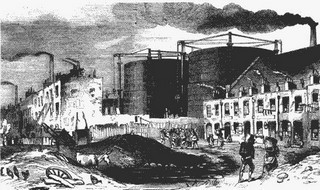 Blake's Dark Satanic Mills
Blake's Dark Satanic MillsIt's National Short Story week in the UK, so I wanted to post a poem that told a story. My father's mother came from an Irish family who worked in the cotton mills. They came to Carlisle in Cumbria to work in Dixon's Mill - one of the biggest mills in the city and lived in one of the tiny 'tied' houses nearby, literally two up and two down for the whole family. My great grandfather started work at the age of 12 on the machines, but became a pattern maker, punching holes in the cardboard sheets that were fed into the machines to 'programme' them - a bit like pianola rolls. He suffered from emphysema and died from it when I was a young child. One of the best mill museums is Arkwright's Masson Mill in Matlock Bath - they've kept it just as it was when the last workers walked out. It gave me a big insight into the lives of my ancestors and these two poems were written there. For a really good short story written in the voice of a young girl who has worked in the mills, by Catherine Czerkawska, please follow this link to Eliza Marshall's Tale.
Strands
Unpicked,
finer than baby hair,
the thread
without the seed still
wants to float
like dandelion fluff
hanging
on a puff of air.
But stretched, tautened,
twisted together
cotton fibre makes a weft
as strong as spider silk to case
the cushions of Cleopatra
shroud the mummies of the Nile
and weave a slave’s shift,
to clog the lungs of northern lasses
coughing up a history
printed in blood.
Dixon’s Mill
My great grandfather worked this mill
aged twelve, crawling beneath
the clattering, bucking iron mules
that tore the cotton, threading the air
with fibre, twisting it into yarn,
to weave a million sheets
and pillow cases, hand towels
fancy table covers slubbed
and woven into country scenes
with roses, cottages and wooded hills.
Older, became a pattern maker
punching the holes to set the looms
and skilled at Jacquard which
paid more than just a living wage,
though when I knew him
he was coughing lint from his lungs
in an upstairs room,
spooning watery porridge
like the snot he hawked up
into a shaving mug beside the bed.
© Kathleen Jones
For more Tuesday Poems, please take a look at the Tuesday Poem Hub - where you'll find good poetry from around the world.
Published on November 13, 2012 05:33
November 11, 2012
Martinmas in Italy - not for vegetarians!
It’s St Martin’s day today – what’s called Martinmas in England – one of the old feast days to celebrate the time when crops had been harvested and cattle were being slaughtered before the winter set in. In Italy it’s still celebrated with food fairs and big meals.
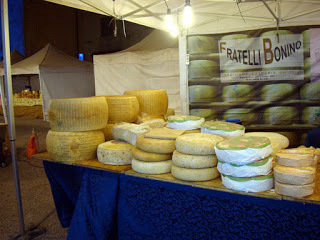 Last night the piazza in Pietrasanta was full of stalls offering local cheeses, dried mushrooms, cakes, chestnuts,
Last night the piazza in Pietrasanta was full of stalls offering local cheeses, dried mushrooms, cakes, chestnuts,
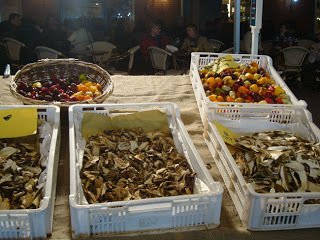
and lots and lots of meat.
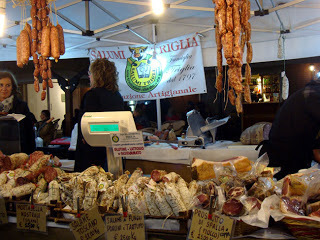
Everything from sausages and salami to a whole pig. This is not a feast for vegetarians!
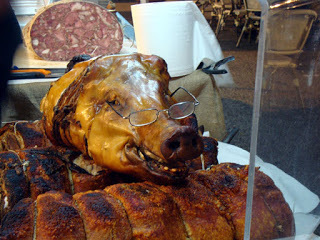
They’re also celebrating the arrival of the new wine, just pressed and the new season's olive oil. I can't believe that something that tastes so nice can actually be good for you. When it's new it's thick and peppery and you can taste the olives in it.
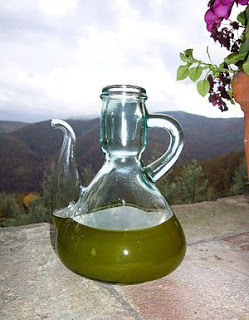
Everyone around us is picking olives and the woods are ringing with the rattle and tap-tap-tap of canes knocking the olives from the twigs. It sounds like a plague of woodpeckers! The Frantoia just down the road from us is working flat out to press the oil. I had a taste of the new wine last night, at the local Cantina which was having a St Martin's celebration, and it’s very, very nice this year – mellow, still fizzy and slightly sweet, but will age into something dark and velvety. Not all years are the same, depending on the weather – sometimes it’s acidic and rough.
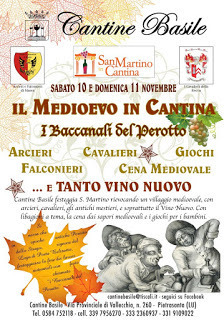
Then we went out to have supper with friends – not a Bacchanalian feast, but a very good meal. It's a very international community here and there were a couple of Italians, a Norwegian, a Dane, an Austrian, a Canadian and an American as well as the English. There really isn't anything nicer than sitting round a table with people you like, eating and drinking and talking, candles on the table and a roaring log fire in the stove. One of the worst storms of the year was raging outside (parts of Genoa evacuated, serious flooding in Massa and Carrara) but it felt very cosy, at least until we had to drive up the mountain road again in wild, wild weather! I'm going to have to buy a pair of rubber boots.
Published on November 11, 2012 10:06
November 10, 2012
Awesome Indies lists 'The Sun's Companion'
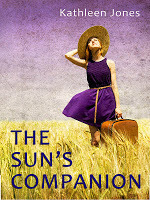
How do you find good, independently published, books to read among what some people have called the 'tsunami of crap' that is swilling around out there on Amazon? Awesome Indies, run by Tahlia Newland, thinks it has the answer. It lists books vetted by established authors, sometimes also read by their own panel of reviewers, which they believe to have reached a high professional standard. You know, when you choose a book listed on Awesome Indies, that the grammar will be checked, it will be proof-read and the story will make sense! And that the book comes recommended by other authors.
So I'm very, very pleased that 'The Sun's Companion', with five star reviews from authors such as Linda Gillard, Debbie Bennett and Wendy Robertson, was thought good enough to be included in their Historical Fiction category. Sites like this are the new gatekeepers in BookWorld, sifting the well-crafted books from the virtual slush-pile that is now the self-publishing jungle. Thank you Awesome Indies for giving me the stamp of approval for The Sun's Companion. Hopefully, now more people will buy it! :-))
Published on November 10, 2012 05:37
November 7, 2012
Four More Years!
Published on November 07, 2012 03:19
November 5, 2012
Tuesday Poem: Czeslaw Milosz
My Tuesday Poem this week, was the TLS poem of the week on Oct 30th - Andrew McCulloch's article copied below - to read the whole thing in its original form please head on over
to the TLS.
The Advisor
Well, it is true that the landscape changed a little, for a lot.
We have factories now and waste tanks where the forests were.
As we approach the river-mouth we hold our noses:
A current of oil and chlorine and methyl compounds.
A huge stain of synthetic colour poisons the fish of the sea.
Where the rushes grew, fringing the sea shore,
Are rusted and smashed machines, ashes, bricks.
We used to read in the ancient poets the scents of the earth,
And grasshoppers; now we take pains to avoid the fields,
And pedal as fast as we can through the chemical zone of the farmer.
The insect, the bird, are wiped out. Far away, a bored man
Drags dust with his tractor, umbrella against the sun.
But what do we regret? The tiger? The shark?
– It may be the case that when Adam awoke in the garden
The beasts licked the air, were yawning and friendly
While the scorpion’s tail was lashed to his back, fangs
Were only a figure, and the red-backed shrike,
Later, much later, named Lanius collurio,
Did not impale grubs on the spikes of blackthorn.
However, apart from and after that moment, our knowledge
Of Nature is not in its favour; our own was no worse.
And so, I beg you, no more of these lamentations.
CZESLAW MILOSZ
Translated by the author and James Shearing (2004)
The Nobel Prize-winning poet Czesław Miłosz (1911–2004) decided to call his 1981–82 Charles Eliot Norton lectures “The Witness of Poetry” not, he said, “because we witness it, but because it witnesses us”. In words from his poem “You Who Wronged”, inscribed on a plaque put up in 1980 to commemorate those killed at the Lenin shipyard in Gdańsk a decade earlier, “the poet remembers. You can kill one, but another is born. The words are written down, the deed, the date”.
Miłosz witnessed and took part in some of the crucial political events of the twentieth century. Born in Lithuania to the Polish-speaking gentry, he was a child in Russia when the Revolution broke out (his father was a bridge-builder for the Tsar’s army), lived in Warsaw during the Nazi Occupation, where he witnessed the destruction of the ghetto and the tragedy of the uprising, left his post as Polish cultural attaché in Paris in 1951 to stay in the West, and moved to California during the Vietnam war. At the end of his life, he returned to his Polish roots in Kraków where he carried on working into his nineties. As Michael Irwin has said, even if he had never written a line, Miłosz would be an intriguing figure “merely by virtue of his survival”. Seamus Heaney called his life “a kind of twentieth century pilgrim’s progress”.
And yet he saw himself as neither hero nor saint but simply a man attempting to understand reality. “The ideal life for a poet”, he maintained, “is to contemplate the word is“, a quest that leads, in “The Advisor”, to a conflict between materialism and the consolations of a faith to which it is perhaps difficult to return in the light of what we have learnt about ourselves over the past century. The landscape Miłosz presents here has been ravaged by scientific and industrial progress. But the cynical advice to regard man merely as an evolved animal is ironically undercut by a haunting echo of old beliefs. The reference to Adam waking in the garden is an explicit reminder of the dawn of the consciousness that separates us from the unthinking cruelty of the scorpion and the red-backed shrike, creatures whose existence is governed only by biological determinants. Evolutionary biology can shade into social Darwinism if we let it. It is only by naming the beasts that we rise above them.
Please check out the Tuesday Poem hub and take a look at what other Tuesday Poets are posting.
The Advisor
Well, it is true that the landscape changed a little, for a lot.
We have factories now and waste tanks where the forests were.
As we approach the river-mouth we hold our noses:
A current of oil and chlorine and methyl compounds.
A huge stain of synthetic colour poisons the fish of the sea.
Where the rushes grew, fringing the sea shore,
Are rusted and smashed machines, ashes, bricks.
We used to read in the ancient poets the scents of the earth,
And grasshoppers; now we take pains to avoid the fields,
And pedal as fast as we can through the chemical zone of the farmer.
The insect, the bird, are wiped out. Far away, a bored man
Drags dust with his tractor, umbrella against the sun.
But what do we regret? The tiger? The shark?
– It may be the case that when Adam awoke in the garden
The beasts licked the air, were yawning and friendly
While the scorpion’s tail was lashed to his back, fangs
Were only a figure, and the red-backed shrike,
Later, much later, named Lanius collurio,
Did not impale grubs on the spikes of blackthorn.
However, apart from and after that moment, our knowledge
Of Nature is not in its favour; our own was no worse.
And so, I beg you, no more of these lamentations.
CZESLAW MILOSZ
Translated by the author and James Shearing (2004)
The Nobel Prize-winning poet Czesław Miłosz (1911–2004) decided to call his 1981–82 Charles Eliot Norton lectures “The Witness of Poetry” not, he said, “because we witness it, but because it witnesses us”. In words from his poem “You Who Wronged”, inscribed on a plaque put up in 1980 to commemorate those killed at the Lenin shipyard in Gdańsk a decade earlier, “the poet remembers. You can kill one, but another is born. The words are written down, the deed, the date”.
Miłosz witnessed and took part in some of the crucial political events of the twentieth century. Born in Lithuania to the Polish-speaking gentry, he was a child in Russia when the Revolution broke out (his father was a bridge-builder for the Tsar’s army), lived in Warsaw during the Nazi Occupation, where he witnessed the destruction of the ghetto and the tragedy of the uprising, left his post as Polish cultural attaché in Paris in 1951 to stay in the West, and moved to California during the Vietnam war. At the end of his life, he returned to his Polish roots in Kraków where he carried on working into his nineties. As Michael Irwin has said, even if he had never written a line, Miłosz would be an intriguing figure “merely by virtue of his survival”. Seamus Heaney called his life “a kind of twentieth century pilgrim’s progress”.
And yet he saw himself as neither hero nor saint but simply a man attempting to understand reality. “The ideal life for a poet”, he maintained, “is to contemplate the word is“, a quest that leads, in “The Advisor”, to a conflict between materialism and the consolations of a faith to which it is perhaps difficult to return in the light of what we have learnt about ourselves over the past century. The landscape Miłosz presents here has been ravaged by scientific and industrial progress. But the cynical advice to regard man merely as an evolved animal is ironically undercut by a haunting echo of old beliefs. The reference to Adam waking in the garden is an explicit reminder of the dawn of the consciousness that separates us from the unthinking cruelty of the scorpion and the red-backed shrike, creatures whose existence is governed only by biological determinants. Evolutionary biology can shade into social Darwinism if we let it. It is only by naming the beasts that we rise above them.
Please check out the Tuesday Poem hub and take a look at what other Tuesday Poets are posting.
Published on November 05, 2012 16:30
November 4, 2012
A Publisher's View: Scott Pack talks to Kathleen Jones
Do Authors Dream of Electric Books?: A Publisher's View: Scott Pack talks to Kathleen ...: Once called ‘the most powerful figure in British books’, when he was head buyer for Waterstone’s, Scott Pack then joined the innovative Friday Project and is now with Harper Collins. Find out what he has to say about the 'indie' e-publishing revolution on Authors Electric.
Published on November 04, 2012 23:28
November 2, 2012
The Next Big Thing: Work in Progress
I wouldn't normally put up another blog this week, but I've been tagged on
Richard Wright's blog
in the Next Big Thing. Richard is a fellow member of the Alliance of Independent Authors and writes dark fantasy and horror (be afraid - be very afraid!) - and he's currently writing about Burke and Hare.
The object of the Next Big Thing is that authors answer ten set questions about their new work in progress and then link to three more authors who are also working on a new book. That way, as many people as possible get to find out what's going on and maybe discover some new authors! So, here's my attempt to answer the questions.
What is the title of your work in progress?
The Centauress. This refers to the subject of the book, which is the life of a painter who was born in the first decades of the 20th century, of indeterminate gender, (about one in every 2,000 babies born has some kind of gender anomaly). The image of the Centauress - half horse/half human - becomes the symbol of her dual identity.
Where did the idea come from for this book?
In the 1950s one of my aunts ran off with a woman who was rumoured in the village to be a hermaphrodite - later I knew two other people who were born 'inter-sex' as it's sometimes called, and I've known several transexuals. The business of gender identity has always fascinated me.
What genre does your book fall under?
I suppose it would have to be Literary Fiction, because of the subject matter. It's a serious book, that deals with gender and identity, and also how we deal (or don't deal) with difference in society.
What authors would you choose to play your characters in a movie rendition?
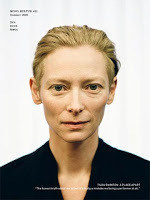 I'd have to choose Tilda Swinton I think, to play the aging painter, because she's such a superb character actor and has such a gloriously androgenous face.
I'd have to choose Tilda Swinton I think, to play the aging painter, because she's such a superb character actor and has such a gloriously androgenous face.
For the second female lead, the biographer Alex Forbes, it would have to be Emily Watson, because that's how I imagine Alex to look. Alex is recovering from depression and trying to find some meaning in her life again after the person she loved most is killed in a terrorist attack.
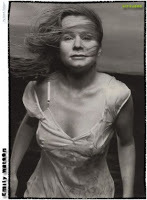
And for the Italian jazz musician she falls in love with, it has to be Raoul Bova (anyone see Under the Tuscan Sun?)
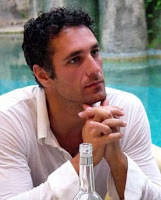
What is the one sentence synopsis of your book?
Biographer Alex Forbes, bereaved in a terrorist attack, goes to Istria to interview celebrity artist and transexual Zenobia de Braganza, who is dying, and wants to tell her tragic and scandalous story, opposed by predatory relatives and protective friends.
Will your book be self-published or represented by an agency?
I have an agent, but on this occasion I'm self-publishing.
How long did it take you to write the first draft of your manuscript.
Two long years. And I'm still scribbling!
What other books would you compare this story to within your genre?
I'm not sure there are other stories like this. It's a love story, the story of someone's life, a mystery, family secrets, the struggle to find an identity, how we deal with tragedy - like most other novels I suppose. Michael Foucault's 'Herculine Barbin' perhaps, although that's the memoir of a 19th century hermaphrodite with editorial commentary. Maggie O'Farrell's 'The Hand that First Held Mine' has some similar themes of family secrecy and the unpicking of a story, weaving two stories together in time.
Who or what inspired you to write this book?
A very remarkable woman who died some years ago - courageous and charismatic and a superb artist.
What else about your book may pique the readers' interest?
It's set in one of the most beautiful parts of Croatia - Istria - once owned by Venice, and the novel is set in the aftermath of the Croatian/Serbian war. An interesting time historically.
My current novel (also historical) on Amazon and Kobo is The Sun's Companion.
My Selected authors are:
Sue Millard
Sue is an expert on horses and carriage-driving as well as a prolific author. Her recent historical novel Coachman, set in London and Cumbria at the time when the 19th C coaching industry was being overtaken by the railway, has been getting excellent reviews. Another recent publication is a comic fantasy novel 'Dragonbait', published by Jackdaw E Books. This is her standard Blurb.
'I am a published author, currently freelancing in web management, and previously employed by the University of Cumbria as a lecturer in computing. My first degree is in English Literature, and I gained my Masters degree in Multimedia Computing while working full time. I am well known in the Fell Pony Society. I judge ponies, serve on its Council, manage its website and edit its twice-yearly Magazine. I’ve had poetry published by The Interpreter’s House, Pennine Platform, Prole, Snakeskin, Lighten Up Online and Candlestick Press. I give talks to local organisations and make sales of my books that way as well as via the trade. I moderate an online writers’ forum, Great Writing, and enjoy meetings of a local writers’ group that I started in 2008.'
 Jackdaw E Books: Sue Millard www.jackdawebooks.co.ukJackdaw E Books is the publishing imprint of Cumbrian writer Sue Millard
Jackdaw E Books: Sue Millard www.jackdawebooks.co.ukJackdaw E Books is the publishing imprint of Cumbrian writer Sue Millard
http://suemillard.blogspot.com/
Cally Phillips
Cally Phillips (1963-) has had a writing career spanning 20 years. Stage plays and screenworks formed the bulk of her professional career, and she has been broadcast on BBC and ITV as well as on radio. She was dramatist in residence in Dumfries and Galloway 2002-2004 as well as holding other residencies and facilitation posts. She was founding director of Bamboo Grove Theatre Company from 2002 -2006.She is in the process of publishing her back catalogue of stage plays for ebook format through HoAmPresst Publishing. She also publishes 'advocacy' work through the Guerrilla Midgie Press imprint including A WEEK WITH NO LABELS(2012)She has also written short stories in Scots including the collections IT WISNAE ME and VOICES IN MA HEID.Latterly novels have taken precedence in her writing portfolio. Her first novel THE THREADS OF TIME (2003) was followed by ANOTHER WORLD IS POSSIBLE (2007) and BRAND LOYALTY (2010) continues her unique and individualistic contribution to the literary genre. She is currently working on several adaptations from her stage works and a new 'trilogy in four parts'.It has been said that Cally 'thinks her way through life' and certainly her writing reflects this characteristic. It is idioscyncratic, challenging, open and revealing, exploring difficult concepts such as identity and the nature of reality, employing a range of literary styles but engaging the reader through compellingly believable characters and stories that keep you thinking long after the final page.http://www.callyphillips.co.uk
Allan Russell
Allan lives in Australia and published his first indie historical novel, Veiled in Shadows, two years ago and is now working on another. Allan blogs at Publish or Perish.
If avant garde is your thing you might also like Dan Holloway - poet and experimental fiction author who has several blogs - including the Cynical Self-publisher and The Man who Painted Agnieska's Shoes.

The object of the Next Big Thing is that authors answer ten set questions about their new work in progress and then link to three more authors who are also working on a new book. That way, as many people as possible get to find out what's going on and maybe discover some new authors! So, here's my attempt to answer the questions.
What is the title of your work in progress?
The Centauress. This refers to the subject of the book, which is the life of a painter who was born in the first decades of the 20th century, of indeterminate gender, (about one in every 2,000 babies born has some kind of gender anomaly). The image of the Centauress - half horse/half human - becomes the symbol of her dual identity.
Where did the idea come from for this book?
In the 1950s one of my aunts ran off with a woman who was rumoured in the village to be a hermaphrodite - later I knew two other people who were born 'inter-sex' as it's sometimes called, and I've known several transexuals. The business of gender identity has always fascinated me.
What genre does your book fall under?
I suppose it would have to be Literary Fiction, because of the subject matter. It's a serious book, that deals with gender and identity, and also how we deal (or don't deal) with difference in society.
What authors would you choose to play your characters in a movie rendition?
 I'd have to choose Tilda Swinton I think, to play the aging painter, because she's such a superb character actor and has such a gloriously androgenous face.
I'd have to choose Tilda Swinton I think, to play the aging painter, because she's such a superb character actor and has such a gloriously androgenous face.For the second female lead, the biographer Alex Forbes, it would have to be Emily Watson, because that's how I imagine Alex to look. Alex is recovering from depression and trying to find some meaning in her life again after the person she loved most is killed in a terrorist attack.

And for the Italian jazz musician she falls in love with, it has to be Raoul Bova (anyone see Under the Tuscan Sun?)

What is the one sentence synopsis of your book?
Biographer Alex Forbes, bereaved in a terrorist attack, goes to Istria to interview celebrity artist and transexual Zenobia de Braganza, who is dying, and wants to tell her tragic and scandalous story, opposed by predatory relatives and protective friends.
Will your book be self-published or represented by an agency?
I have an agent, but on this occasion I'm self-publishing.
How long did it take you to write the first draft of your manuscript.
Two long years. And I'm still scribbling!
What other books would you compare this story to within your genre?
I'm not sure there are other stories like this. It's a love story, the story of someone's life, a mystery, family secrets, the struggle to find an identity, how we deal with tragedy - like most other novels I suppose. Michael Foucault's 'Herculine Barbin' perhaps, although that's the memoir of a 19th century hermaphrodite with editorial commentary. Maggie O'Farrell's 'The Hand that First Held Mine' has some similar themes of family secrecy and the unpicking of a story, weaving two stories together in time.
Who or what inspired you to write this book?
A very remarkable woman who died some years ago - courageous and charismatic and a superb artist.
What else about your book may pique the readers' interest?
It's set in one of the most beautiful parts of Croatia - Istria - once owned by Venice, and the novel is set in the aftermath of the Croatian/Serbian war. An interesting time historically.
My current novel (also historical) on Amazon and Kobo is The Sun's Companion.
My Selected authors are:
Sue Millard
Sue is an expert on horses and carriage-driving as well as a prolific author. Her recent historical novel Coachman, set in London and Cumbria at the time when the 19th C coaching industry was being overtaken by the railway, has been getting excellent reviews. Another recent publication is a comic fantasy novel 'Dragonbait', published by Jackdaw E Books. This is her standard Blurb.
'I am a published author, currently freelancing in web management, and previously employed by the University of Cumbria as a lecturer in computing. My first degree is in English Literature, and I gained my Masters degree in Multimedia Computing while working full time. I am well known in the Fell Pony Society. I judge ponies, serve on its Council, manage its website and edit its twice-yearly Magazine. I’ve had poetry published by The Interpreter’s House, Pennine Platform, Prole, Snakeskin, Lighten Up Online and Candlestick Press. I give talks to local organisations and make sales of my books that way as well as via the trade. I moderate an online writers’ forum, Great Writing, and enjoy meetings of a local writers’ group that I started in 2008.'
 Jackdaw E Books: Sue Millard www.jackdawebooks.co.ukJackdaw E Books is the publishing imprint of Cumbrian writer Sue Millard
Jackdaw E Books: Sue Millard www.jackdawebooks.co.ukJackdaw E Books is the publishing imprint of Cumbrian writer Sue Millardhttp://suemillard.blogspot.com/
Cally Phillips
Cally Phillips (1963-) has had a writing career spanning 20 years. Stage plays and screenworks formed the bulk of her professional career, and she has been broadcast on BBC and ITV as well as on radio. She was dramatist in residence in Dumfries and Galloway 2002-2004 as well as holding other residencies and facilitation posts. She was founding director of Bamboo Grove Theatre Company from 2002 -2006.She is in the process of publishing her back catalogue of stage plays for ebook format through HoAmPresst Publishing. She also publishes 'advocacy' work through the Guerrilla Midgie Press imprint including A WEEK WITH NO LABELS(2012)She has also written short stories in Scots including the collections IT WISNAE ME and VOICES IN MA HEID.Latterly novels have taken precedence in her writing portfolio. Her first novel THE THREADS OF TIME (2003) was followed by ANOTHER WORLD IS POSSIBLE (2007) and BRAND LOYALTY (2010) continues her unique and individualistic contribution to the literary genre. She is currently working on several adaptations from her stage works and a new 'trilogy in four parts'.It has been said that Cally 'thinks her way through life' and certainly her writing reflects this characteristic. It is idioscyncratic, challenging, open and revealing, exploring difficult concepts such as identity and the nature of reality, employing a range of literary styles but engaging the reader through compellingly believable characters and stories that keep you thinking long after the final page.http://www.callyphillips.co.uk
Allan Russell
Allan lives in Australia and published his first indie historical novel, Veiled in Shadows, two years ago and is now working on another. Allan blogs at Publish or Perish.
If avant garde is your thing you might also like Dan Holloway - poet and experimental fiction author who has several blogs - including the Cynical Self-publisher and The Man who Painted Agnieska's Shoes.
Published on November 02, 2012 15:17
November 1, 2012
Memory and Imagination
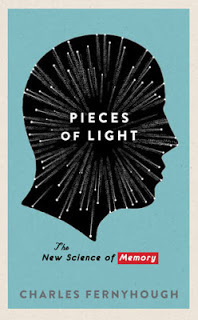 Pieces of Light: The New Science of Memory by Charles Fernyhough
Pieces of Light: The New Science of Memory by Charles Fernyhough
This has been my bedside reading for the past couple of weeks. I’ve always been interested in the way Memory and Imagination work together to create. How the imagination takes all the snippets of things we’ve stored in our brains over the years and weaves them into something completely new. What I didn’t realise, until I read Charles Fernyhough’s book, Pieces of Light, was just how dependent the memory was on imagination in order to enable us to remember.
It seems that our memories of past events aren’t stored in one place, like a video film, just waiting to be re-run, but in bits and pieces of information in different parts of the brain; smell in one place, sound in another, visual and emotional cues in others. When we try to remember something that happened to us in the past, our imagination comes into play to reconstruct the memory as a narrative, which explains why people remember things so differently, and memories alter through time - a minor detail when the event took place might acquire real significance later.
In amnesia victims, where the part of the brain that controls imagination is damaged, memory is severely disrupted and ‘forward thinking’ - the ability to speculate about the future - is impossible.
The way we encode our lives in the memory is also interesting - apparently we are all natural story-tellers. ‘Narrative,’ Fernyhough states, ‘is a key organisational force in autobiographical memory.’ We remember events as stories, pieces of narrative. The author comments in the book, ‘I set out to write about some science, and I ended up by telling a lot of stories’. It’s the story our brain remembers while the event itself fades. Our lives become a series of narratives. We seem to have a need to ‘create a coherent narrative about where one has come from’. But apparently it sacrifices accuracy in order to produce ‘meaning’ - the emotional value of the event is more important than the small detail.
Charles Fernyhough also looks at how, by giving fictional characters rich memory banks, we can make them more authentic for the reader. He uses Hilary Mantel’s Wolf Hall as an example of this, and discusses the work of W.G. Sebald and how he used memory to give a sense of reality - the texture of memoir - to his novels. Reading them, you are never sure whether this is reminiscence or fiction. There is ‘a kind of active remembering in which the world and self-hood are continually constructed and reconstructed - from present-day events and from not-quite-intelligible fragments of the past’.
There are some lovely interviews with Charles Fernyhough’s mother Martha, attempting to recall her life in conversations with the author, reconstructing it and discovering new perspectives as she gazes back at it across eight decades.
I liked the quote from a critic, discussing Proust (you can't really talk about memory without mentioning him): “Like our eyes, our memories must see double; these two images then converge in our minds into a single heightened reality”. Fernyhough goes on to elaborate: ‘Our two eyes, stereoscopically aligned, allow us to see space; memory allows us to ‘see’ time. Memories are about what happened then, but they are also about who we are now’.
Published on November 01, 2012 13:51
October 29, 2012
Tuesday Poem: How to Roast Chestnuts
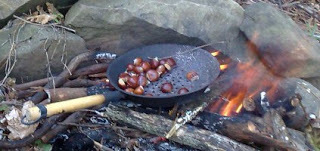
Split the porcupine case
and shell them from their bed of white pith
unblemished - discarding those
already bored by worm. Keep dry.
A roaring fire of wood, or charcoal.
Sprinkle salt till it turns blue
and sparks like a Roman Candle.
Place the chestnuts in a cast-iron pan
with holes to let in the flames
and roast until the skin blackens and
curls back from the wrinkled cerebellum
and they smell of ice fairs, hallowe’en
the street corners of a foreign town
all our northern childhoods.
© Kathleen Jones
Happy Hallowe'en everyone! And do hop over to the Tuesday Poem hub for more contributions from the Tuesday Poets.
Published on October 29, 2012 14:08




